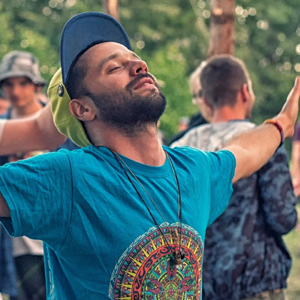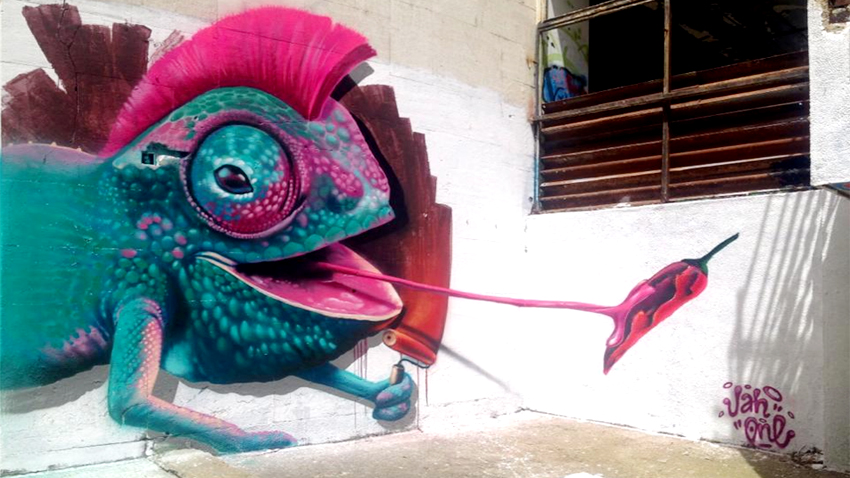He draws on building facades and has an authentic style. Graffiti chose me. I didn't choose graffiti and never thought I would paint with graffiti spray bottles, the guy known on the Internet as Ioan Baraban told Radio Bulgaria.
 “Ioan Baraban is a humble street artist, also known as JahOne. The name comes from the Rastafari culture which preaches peace, unity and love among people and is entirely against violence and war. It has a lot in common with what I do and with what makes people happy, feel good and smile. Graffiti is a way to reach peoples' hearts.”
“Ioan Baraban is a humble street artist, also known as JahOne. The name comes from the Rastafari culture which preaches peace, unity and love among people and is entirely against violence and war. It has a lot in common with what I do and with what makes people happy, feel good and smile. Graffiti is a way to reach peoples' hearts.”
JahOne has been painting throughout his whole life. Once, he used to depict his favorite heroes, familiar people and landscapes on paper. Today, however, he paints across the whole city. JahOne graduated from the National Academy of Arts. He has already decorated many public and private buildings in Sofia, Plovdiv, Yambol, Bansko, etc. He also made graffiti on strange places such as a lorry equipped with a portable kitchen. He never looks for the perfect wall for his graffiti. He relies on his intuition instead.
“The places I choose for my graffiti often tell me what to paint on them” JahOne told Radio Bulgaria.

It all depends on the location and on whether someone orders certain graffiti or I paint freely. A graffiti depicting the Ultraviolet Queen of Triangular Consciousness was painted in a private house yard. It is hidden to most passers-by, yet it can be seen by many neighbors. The place itself told us what to paint on it - we did what we saw there.

Unlike the solitary street artists, JahOne likes to share his art with others. That is why he made his L.O.V project jointly with graffiti painter TASK. "Our main idea is to share our love in art through the walls we paint on”, JahOne further says. One of their joint projects depicts a multi-colored female face on a building wall in Mladost 1 district in Bulgaria's capital Sofia.

In JahOne's view artists should be responsible for every project which leaves permanent marks in the city. This is why he condemns all types of scribbles on building facades. In his view, the buildings in this country would not look so messed up, if the authorities launched more areas as the ten-meter long wall on the main alley in Burgas. However, the street artist believes that art can turn even the most crooked place into a beautiful spot. In JahOne's view, this is what happened with the panel buildings in Poduyane and Hadji Dimitar districts in Sofia. Should people paint graffiti on monuments such as the Monument to the Soviet Army which has been painted in graffiti many times? More from JahOne:
“If you talk about the superheroes painted on that monument I would say that I am very happy that such thing ever happened in Bulgaria. Some political parties reacted sharply to that, because they still treat seriously monuments which have already lost the value they had in the past. That is why it is good to make art on such monuments, because they represent something that stayed in the past.”

However, graffiti painters should not work on all types of buildings and places, JahOne contends. In his view, it is absolutely intolerable to reshape facades of architectural monuments or ancient buildings. He does not even think of doing that. The street artist is currently working on a project aimed at remodeling the city park in Montana. He will pay special attention to his future work of art to Diana, because in his words, Goddess Diana protects that Bulgarian city.
English version: Kostadin Atanasov
Europe Day or Victory Day? May 8th or May 9th? It is not that we do not constantly encounter socially divisive topics, and the current date – May 9th celebrating the victory over Nazi Germany in 1945 in World War II also causes debates in Bulgaria year..
The FameLab International Science Communication Competition aims to discover, train and give a platform to the world’s most promising new scientists. The competition was created in 2005 by the Cheltenham Science Festival, the largest and most..
"United We Stand" - Bulgaria's national motto - will be put into action on May 8 by the Bulgarian community in New York City, amid the realities of the times and the distance from home. At 7 pm local time, the Bulgarian Consulate General and the NYC..
"Alphabet of Beer" is the first title I came up with 15 years ago, when I started collecting my beer stories," journalist of the..
"United We Stand" - Bulgaria's national motto - will be put into action on May 8 by the Bulgarian community in New York City, amid the realities of the..
"We may be 10 hours behind Bulgaria, but our compatriots on the West Coast of the United States deeply cherish everything that connects them to Bulgaria..

+359 2 9336 661
